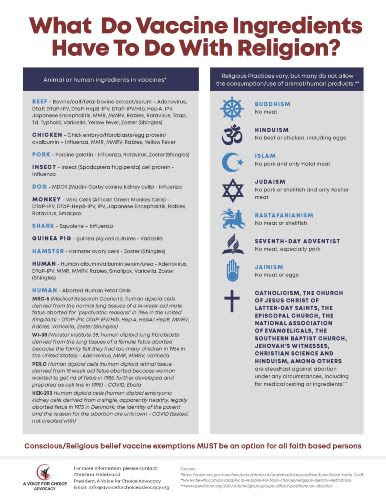"Nothing is more powerful than an idea whose time has come."
Alternate Website Access:
Vaccine Exemption Information
Media says 'required.' We say 'not true!'

US colleges/universities are requiring COVID vaccination for enrollment.
Religious and Medical Exemptions are available,
but they must be carefully written to be accepted
While there is outrage by some that colleges and universities are requiring a vaccine that is Emergency Use Authorized and not fully approved, reality is that both the Pfizer and Moderna vaccines are slated to be fully approved by the FDA in the next month, so this becomes a moot point. The clinical trials no longer have a placebo group, because participants are allowed to get the vaccine, so the safety and efficacy of vaccinated vs unvaccinated is no longer possible, making the trials less of a requirement for the FDA. This is what the outrage should be over!
Reality is also that US college and university vaccine requirements are nothing new. Most have had vaccine requirements for the past 70+ years. They usually have offered the same exemptions as those offered to their state's K-12 students, whether that is personal belief exemptions, religious exemptions and/or medical exemptions. These exemptions have always come with accommodations such as having to quarantine if exposed to a contagious disease. Requirements to test and wear masks are new for COVID.
The key is that all but one college, AVFCA is aware of, are offering religious exemptions and medical exemptions for the COVID vaccine for students and staff. The UC and CSU policies are in draft format, but both allow religious exemptions currently. The reasoning AVFCA put forward to the University of California with regard to their flu vaccine requirement, was that if they were offering religious exemptions to their staff, which by law they have to, then they also have to offer them to their students. Otherwise they would be discriminating against their students on religious grounds. Our reasoning seems to have been accepted and has carried over to the CSU system and most other colleges in California, where only a medical exemption is usually available for student only vaccine requirements. However, many have not finalized what format the religious exemption will take, so you may have to wait until they do that to submit it.
As mentioned, there is one college AVFCA is aware of which is not offering a religious exemption, and we have reached out to them in the hopes that they will agree. If your college or university is not offering a religious exemption, please email us with the policy and we will send them a letter. The AVFCA letter to colleges not offering religious exemptions can be read here: https://
Religious Exemption Law and Wording
Over the past year, A Voice for Choice Advocacy has successfully helped hundreds of individuals get their religious accommodation requests approved. While some other organizations have or sell templates of religious exemptions on their websites, we do not recommend using these as colleges will not believe they are your sincere beliefs if you are the twentieth person sending in the same letter. We also don't recommend sending a letter from your religious leader unless that is specifically required, and we certainly do not recommend sending one from an entity that is not verifiable.
If you need help with writing a religious exemption or would like us to review it before you submit it, we would be happy to at no cost. Please send the written vaccine policy, including exemption options, a description of your religious beliefs, including religious text quotes (if applicable), your religious upbringing and any other information about the accommodations you are requesting, to info@avoiceforchoiceadvocacy.
While organizations may just ask for a statement that vaccines are against your religious beliefs and you hold those beliefs sincerely, they have the right to ask for more a detailed explanation to determine that those statements are true. They will also deny your religious exemption if they do not believe your beliefs are sincere, or if they are moral, ethical or personal beliefs, rather than religious beliefs. For employees, the questions must be consistent with the guidance from the U.S. Equal Employment Opportunity Commission (EEOC) https://www.eeoc.gov/laws/
- Explain how receiving the vaccine conflicts with or violates your sincerely held religious belief, observance or practice.
- Identify the sincerely held religious belief, observance or practice that prevents you from receiving the flu vaccine (this includes moral or ethical beliefs as to what is right and wrong which are sincerely held with the strength of traditional religious views (29 C.F.R.§1605.1), but it does not include “social, political, or economic philosophies” or personal preferences (U.S. Equal Emp’t Opportunity Comm’n, Questions and Answers: Religious Discrimination in the Workplace, Question 1 (Jan. 31, 2011); U.S. Equal Emp’t Opportunity Comm’n, Compliance Manual, Section 12: Religious Discrimination, at 12-I (Coverage) (July 22, 2008)
While the accommodation you are requesting is an exemption to vaccination for religious reasons, you may also be asked to request other accommodations, if not getting the vaccine would make you unable to meet the required/essential functions of your job and would impose an undue hardship, including compromising safety for your organization.
The First Amendment of the US and California Constitutions, guarantees every American freedom of religion which is not restricted to organized religion. The definition of your religion is your own and you cannot be judged for what it is. Per the 1964 Civil Rights act:
“Title VII protects all aspects of religious observance and practice as well as belief and defines religion very broadly for purposes of determining what the law covers. For purposes of Title VII, religion includes not only traditional, organized religions such as Christianity, Judaism, Islam, Hinduism, and Buddhism, but also religious beliefs that are new, uncommon, not part of a formal church or sect, only subscribed to by a small number of people, or that seem illogical or unreasonable to others. An employee’s belief or practice can be “religious” under Title VII even if the employee is affiliated with a religious group that does not espouse or recognize that individual’s belief or practice, or if few – or no – other people adhere to it. Title VII’s protections also extend to those who are discriminated against or need accommodation because they profess no religious beliefs.
Religious beliefs include theistic beliefs (i.e. those that include a belief in God) as well as non-theistic “moral or ethical beliefs as to what is right and wrong which are sincerely held with the strength of traditional religious views.” Although courts generally resolve doubts about particular beliefs in favor of finding that they are religious, beliefs are not protected merely because they are strongly held. Rather, religion typically concerns “ultimate ideas” about “life, purpose, and death.” Social, political, or economic philosophies, as well as mere personal preferences, are not “religious” beliefs protected by Title VII.”
More details on what constitutes religion is outlined in these two articles:
EOCC: Questions and Answers - Religious Discrimination in the Workplace
National Law Review: Flu Shots, Religious Beliefs, and Employee Rights: Navigating the Complex Intersection.
If you are part of an organized religion, most religious texts have verses that relate to the sanctity of blood and bodily autonomy. If you need ideas, Freedom of Religion - United Solutions has letters from various religious leaders on their website: https://forunitedsolutions.

https://